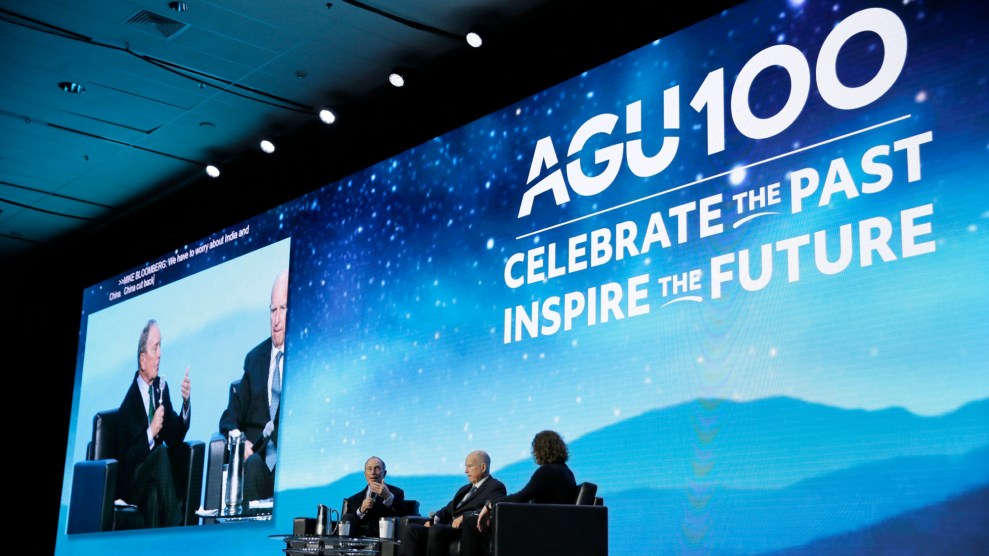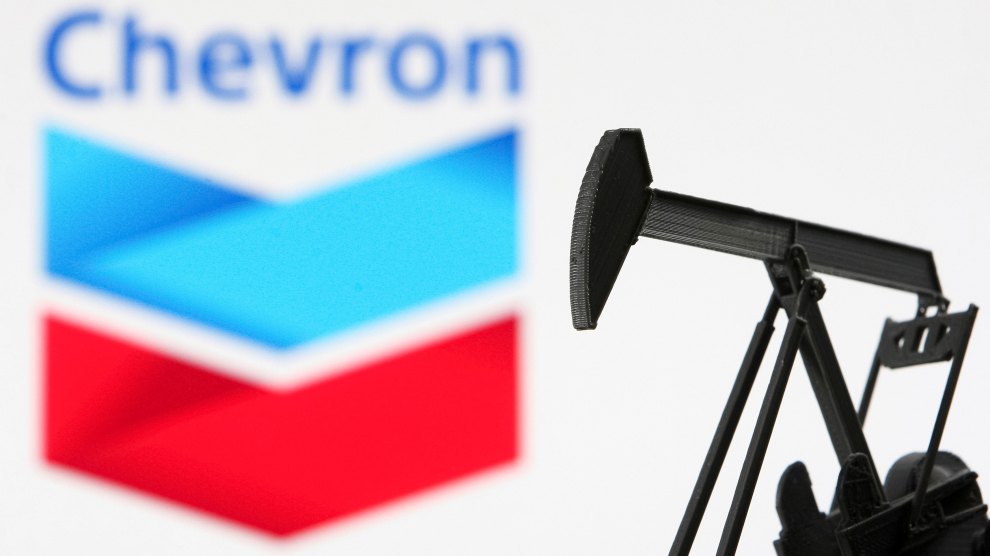
American Geophysical Union fall meeting Wednesday, Dec. 11, 2019, in San Francisco.Eric Risberg/AP
This story was originally published by Inside Climate News and appears here as part of the Climate Desk collaboration.
Scientists who have risked their careers, freedom and livelihoods led a town hall meeting here on Tuesday at the world’s largest annual gathering of earth and space scientists to ask their colleagues to consider what their professional society’s stance should be in relation to the fossil fuel industry.
The scientists aimed to kickstart a discussion among members and leadership of the American Geophysical Union, or AGU, about the ethics of a scientific society associating with an industry known for denying and attacking the science of climate change to delay regulatory action.
“Global heating is a clear and present danger to life on Earth, the primary cause of global heating is fossil fuels, and the fossil fuel industry has colluded for decades to systematically mislead the public and to block climate action at all levels of government,” the session’s description read.
For Peter Kalmus, a climate scientist at NASA’s Jet Propulsion Lab who convened the session and took a vacation day to speak on his own behalf, the path forward was obvious. “I have some strong feelings about the AGU’s relationship with the fossil fuel industry,” Kalmus said. “I feel it was on the wrong side of history in 2016 when they decided to continue taking money from ExxonMobil and it continues now to provide social license to the fossil fuel industry.”
By accepting ExxonMobil’s money, Kalmus said, the AGU was providing legitimacy to the oil giant and allowing it to greenwash its climate science disinformation campaign, documented by Inside Climate News and others in 2015.
ExxonMobil did not immediately respond to a request for comment.
The ethics of AGU accepting money from fossil fuel interests emerged after the 2015 AGU fall meeting, where a prominently displayed poster board thanked the generous contributions of ExxonMobil and Chevron. In early 2016, more than 170 scientists urged their society “to protect the integrity of climate science by rejecting the sponsorship of future AGU conferences by corporations complicit in climate misinformation, starting with ExxonMobil.”
AGU is undermining its stated values as well as the work of its own members, the scientists said, “by allowing Exxon to appropriate AGU’s institutional social license to help legitimize the company’s climate misinformation.”
AGU’s leadership considered the issue at the next meeting of the board of directors, which decided to continue accepting ExxonMobil’s money. “It is not possible for us to determine unequivocally whether ExxonMobil is participating in misinformation about science currently, either directly or indirectly,” the board said in a statement justifying its decision.
At issue was Exxon’s $35,000 sponsorship of a student breakfast at its annual meeting, which the board concluded, “does not constitute a threat to AGU’s reputation.”
“I think it’s interesting that we meet today at the close of another COP28 that I believe is plagued by fossil fuel industry interests and misinformation,” said Rose Abramoff, an expert on climate’s effects on carbon cycling in soil, referring to the global climate talks that ended Tuesday.
Abramoff lost her job at Oak Ridge National Laboratory at the beginning of the year after she and Kalmus staged a protest at last year’s meeting. She now works at the nonprofit Ronin Institute, and said she was more interested in considering the future and hearing from her colleagues in the packed session “what role scientists and the AGU more specifically can and should play in the climate crisis.”
Kalmus, however, is not ready to move on.
“It’s not clear to me how a society for earth scientists can side with the anti-science fossil fuel industry, which lacks integrity and is driving mass deaths globally and irreversible degradation of planetary habitability for their own profit,” said Kalmus, who noted that JPL told him he could not present his science at the meeting if he participated in the town hall. “I made my choice.”
Scientists like Kalmus have grown frustrated that some think it’s controversial to propose that a scientific society with thousands of members who study climate change and its disastrous effects on species, ecosystems and communities cut ties with an industry that has sought to undermine their work.
But the fact that Kalmus—who has been arrested for chaining himself to a bank that finances fossil fuels—had to choose between presenting his science and taking part in a discussion about his professional society’s relationship to the fossil fuel industry, reflects a longstanding belief among scientists that scientific objectivity and credibility requires maintaining neutrality and letting the facts speak for themselves.
But scores of studies show that “facts” often speak on behalf of their sponsors. When scholars scrutinize research funded or conducted by vested interests versus independent sources or scientists, they consistently find that industry-sponsored research tends to produce results that benefit the sponsor’s interests. This “funding effect” holds across every regulated industry studied, including the food, chemical, pharmaceutical, fossil fuel and most famously tobacco industry, the studies show.
“When fossil fuel companies invest in research, they do it with the same agenda that they take to investing in oil and gas projects,” said Ilana Cohen, cofounder of the Campus Climate Network, a nonprofit dedicated to cutting university research ties to the fossil fuel industry. “They want to get a return on their investment. And this is where the pervasive corrupting influence comes into play.”
Sandra Steingraber, a senior scientist with the Science and Environmental Health Network who regularly compiles a compendium of the fracking industry’s health effects, relayed a warning from environmental legend Rachel Carson about the clandestine tactics the chemical industry used to shape public debate.
“She talked about the enormous stream of propaganda coming from the chemical industry, but more specifically coming from organizations who have industry connections,” said Steingraber, who is widely viewed as Carson’s heir. The industry uses scientific societies to hide behind, Carson warned, so that when the scientific organization speaks, the public assumes it is hearing the voice of science.
Carson was speaking of pesticides and the chemical industry, Steingraber said. “You could just swap out ‘pesticides’ for ‘fossil fuels’ and then deliver that speech to AGU tomorrow and it would sound like it was written for the present political moment.”
To understand AGU’s 2016 decision to maintain ties with the fossil fuel industry, you have to understand its history, said Eric Davidson, a biogeochemist and professor at the University of Maryland Center for Environmental Science. Throughout the 20th century, there was a “very strong association” with extraction industries, including various mining and drilling industries, he said. Only over the past two decades has AGU included scientists from the biosciences, environmental global change, science and society and other disciplines.
It wasn’t until 2015 that AGU began thinking about how to align its values with investments of its “considerable resources,” said Davidson, who joined the board that year, left in 2020 and was speaking on his own behalf. He called 2015 “a turning point.”
AGU’s total assets were valued at $198 million in 2021, according to tax filings. The amount Exxon spent to sponsor a student breakfast every year amounted to about one tenth of one percent of AGU’s budget, he said. “It wasn’t about the money.”
There were a wide range of views on the board, Davidson explained, with some agreeing with the petitioners that AGU shouldn’t accept money from organizations whose values aren’t in sync and others who felt it was important to keep the lines of communication open with the fossil fuel industry and make them part of the solution.
At the time of the vote, a former Exxon vice president sat on the board and Exxon and its employees donated more than $620,000 to the organization between 2001 and 2015, Inside Climate News reported.
“The board didn’t reach consensus and the majority voted to continue accepting money from ExxonMobil,” Davidson said, noting that the issue became moot when Exxon withdrew its support that year.
AGU accepted a $10,000 donation from Chevron in 2022 earmarked for diversity, equity and inclusion outreach, an AGU spokesperson said, but “accepts no further corporate donations from fossil fuel companies.”
And earlier this year, AGU completed a process to fully divest its financial portfolio of fossil fuel-based companies, subsidiaries and affiliates.
Davidson said he respected the views of his fellow board members in 2016 but now sees the decision as naive. “We’ve seen quite clearly that the fossil fuel industry has absolutely no intention of becoming part of the solution unless they’re dragged kicking and screaming.”
Instead of relitigating the past, he wanted to focus on the future and pointed to AGU’s change in investment and pledge policies as an example of what scientific societies should be doing.
But Kalmus wants AGU to let the public know that the fossil fuel industry continues to endanger planetary health. The industry has used its vast wealth to propose technologies like carbon capture that radically delay action on phasing out extraction, while “global heating is rising very fast,” Kalmus said. “I would just challenge us to have more imagination at this literally critical time in Earth’s 4.5 billion-year history.”
Kalmus wants AGU to make amends for its 2016 decision, calling it “absolutely horribly wrong.”
“Inside Climate News had literally just published in 2015, Exxon the Road Not Taken,” Kalmus said, referring to the eight-month investigation that revealed Exxon’s own scientists conducted cutting-edge climate research in the late 1970s and 1980s before it pivoted to directing campaigns that cast doubt on global warming science.
“It was very clear even at that point that ExxonMobil and other oil majors were not having any integrity, they were anti-science, they were spreading disinformation,” Kalmus said. He called the board’s claim that there’s no evidence that ExxonMobil lacks integrity “deeply unscientific and embarrassing.”
Until AGU apologizes, he said, “it’s allowing this industry to continue literally destroying, degrading the habitability of our planet and threatening the future of young people. The whole planet is at stake here.”
Abramoff agreed that AGU should use its power and influence to “strip the fossil fuel industry of its legitimacy.”
She’d like to see AGU issue a “strong statement” looking at whether industry disinformation is incompatible with the organization’s goals.
Steingraber, an ecologist who called herself the outsider on the panel, urged AGU members to ask themselves what relationship they want to see with the fossil fuel industry.
It’s important to go beyond investment and divestment, Steingraber said, noting that both are a good first step. Is it OK to have card-carrying members of the AGU be fossil fuel industry employees? What about industry-funded research presented at the conference? Or industry recruiting young talent at the meeting?
“In other words, if one of the goals is to take away the social license for the serial killer that is the fossil fuel industry, then what can AGU do to distance itself from the fossil fuel industry?” Steingraber asked. She encouraged members to “look at all the ways the industry is entangled with your organization and ask yourself which of those pieces you want to untangle.”
As a young person, Cohen said, “it’s frankly disgraceful to me” to not have an unequivocal condemnation of fossil fuel donations from AGU.
“Our futures are really on the line here,” she said. “Young people are looking at you to model leadership here. And if AGU fails to do that, it will be something that we take into account in the way that we pursue our careers and pursue our research in the future.”















